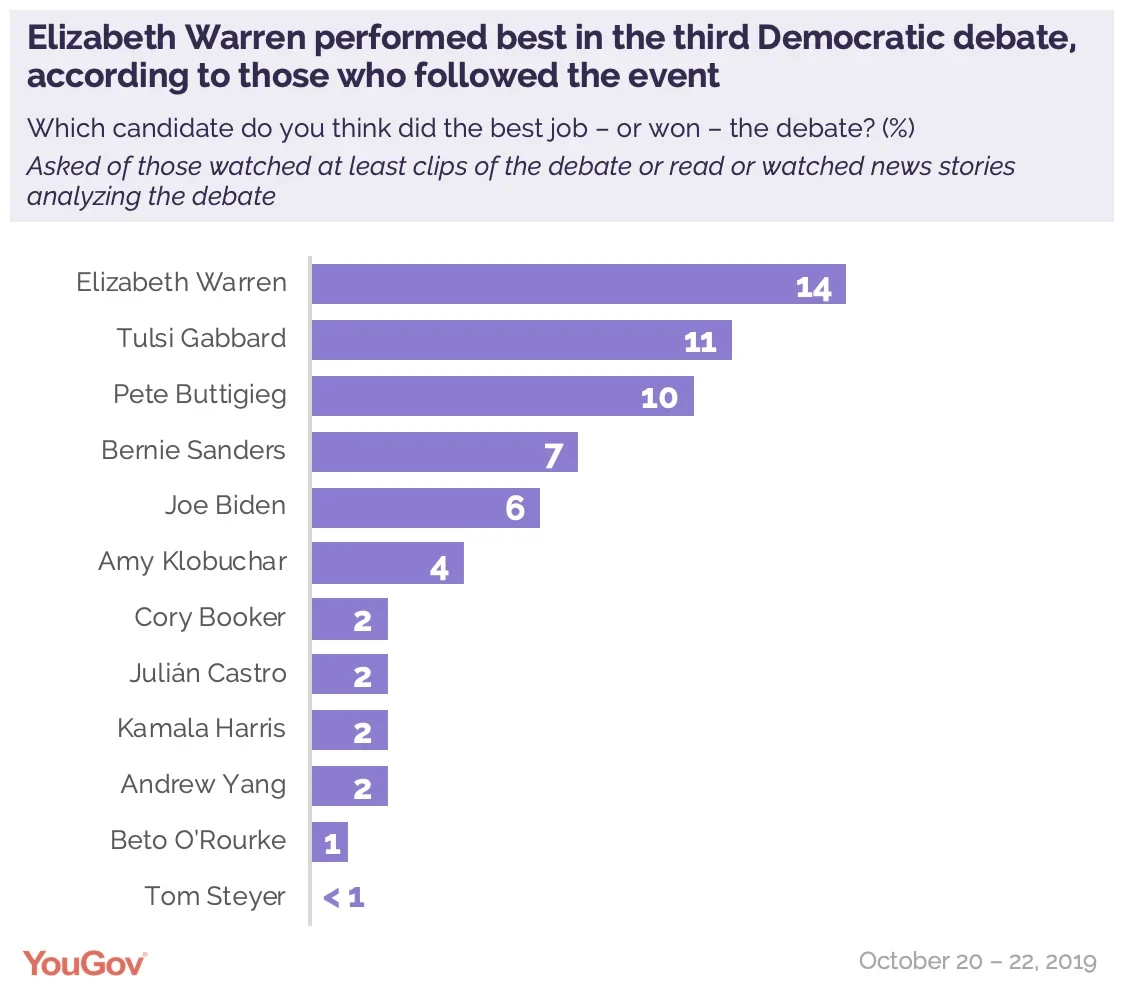Massachusetts Senator Elizabeth Warren remains popular. Warren continues to receive the highest favorable ratings of all the Democratic contenders, and a majority in the latest Economist/YouGov Poll say they are considering supporting her, more than say that about any other candidate.
But Warren's standing with Democratic primary voters may have been tarnished a bit by the attacks made on her by the other Democratic candidates in last week’s debate because former Vice President Joe Biden is now back in front as Democratic voters’ first choice for the nomination.
Last week, Warren was the first choice for 28 percent of Democratic primary voters but she dropped seven points in this week’s poll. Biden remains at about the same level of support this week as last (25% last week; 24% this week). The standings of Vermont Senator Bernie Sanders and the rest of the field also are fairly stable. Sanders’ heart attack did not change the level of support he has as a first-choice candidate (15%). He has been at around this level since late September.
Biden has a slight edge when it comes to the perception of electability: 65 percent of Democratic primary voters believe he can defeat President Donald Trump next November and just 17 percent disagree. For Warren, the comparable percentages are 59 percent and 20 percent. For Sanders, they are 58 percent to 23 percent. That measure may be particularly important this season, as six in 10 (61%) of Democratic primary voters say a candidate’s electability is more important than policy agreement.
There appears to be relatively little hostility among supporters of the three leaders: when voters are asked about their second choice for the nomination, Warren gets the most mentions from both Biden and Sanders supporters. However, there are many (37%) Democratic voters who say they currently have no second choice for the nomination.
Warren can still be considered the queen of the debates. Once again, twice as many Democratic primary voters name her as the candidate who did the best job in the most recent debate as mention any other of the participants. Sanders and Biden, along with South Bend Mayor Pete Buttigieg are each cited by about one in 10 Democrats.

Minnesota Senator Amy Klobuchar was the debate winner for 5 percent of people and 4 percent say the same about Hawaii Representative Tulsi Gabbard.
Gabbard gets mixed reviews from Democratic voters. She has more support than several of the candidates she shared the stage with last week, but Democratic voters in this week’s poll do not have an overall favorable opinion of her. More are unfavorable (37%) than favorable (29%). She is the only one of last week’s debate participants for whom that is the case. Most of the others have favorable ratings at 50 percent or higher. Warren gets favorable assessments from three-fourths (77%) of Democratic voters, while only 13% are unfavorable.
Warren faced criticism during the debate over her answers on questions about the costs of her health care plan, from Klobuchar and others. “Medicare for All,” a concept many of the leading Democratic candidates embrace, does get strong support from Democratic primary voters (although even more support the Affordable Care Act, otherwise known as Obamacare).
However, the public overall is far more closely divided than Democratic primary voters are on both these questions. They are evenly divided on Obamacare, and narrowly supportive of “Medicare for All”. But as for paying for “Medicare for All”, Americans think it will cost them. 46% say their health care costs will go up, 16% think they will go down. Even Democratic primary voters are split evenly on what will be the case.
Those Democratic primary voters who say their health care costs will rise with a “Medicare for All” plan favor Joe Biden. Most of those who expect their costs will go down support either Warren or Sanders, and those who expect no change favor Warren. However, one in five Democratic voters isn’t sure they can expect from a “Medicare for All” plan.
Read the full toplines and tables results from this week’s Economist/YouGov poll.Image: Getty












